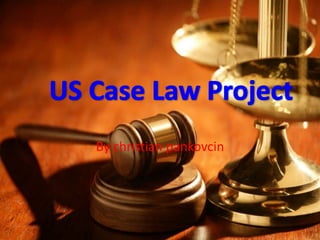
Us case law prodject
- 2. Miranda vs. Arizona is a case that a man (Miranda) was arrested but when arrested they got him to confess to the crime.
- 3. The defense argued because Miranda was never read his writes his confession could not be valid evidence.
- 4. The prosecution argued that because Miranda had once been convicted before he should have already known his rights.
- 5. The court denied his appeal and upheld his conviction. The supreme court ruled that police officers must uphold the 5th amendments. The amendments used in this case were the 5th and 6th amendments
- 6. Scott vs. Stanford is a case about a slave who was living in a slave free state when his owner died and he claimed to be then free.
- 7. The prosecution argued that because he was a slave and property he never had the right to be free or a citizen in the first place
- 8. His defense argued that because he lived in a state that slavery was illegal and his owner was dead he could no longer be a slave
- 9. The court sided with the prosecution. They ruled that because he was a slave originally he was never granted the right of citizen ship and was property and therefore could not be free. The amendments used in this case were the 5th amendment and the 6th amendment.
- 10. Gideon vs. Wainwrite is a case about a man who was refused the provision of a defense attorney when he was on trial for breaking and entering and larceny.
- 11. The defend of Gideon said that because he was convicted without being given a defense attorney he was not entitled to a fair trial.
- 12. The prosecution sea that a lawyer was not needed to be proved for Gideon because it was a more minor case and they were given on in cases where the death penalty may result
- 13. The court ruled that Gideon's conviction was unconstitutional and that because of the 6th amendment right to be proved fair trial and a attorney that all defendants who cant afford a attorney have to be appointed one.